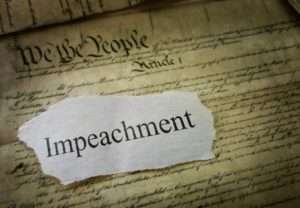The Volokh Conspiracy
Mostly law professors | Sometimes contrarian | Often libertarian | Always independent
Impeachment and Invoking the 25th Amendment are not Mutually Exclusive Options
Both can be pursued simultaneously. And there is potentially good reason to do so.

Since I wrote my previous post on the subject of impeachment, last night, the idea of removing Trump from office has gained additional momentum. Earlier today Democratic Senate leader (and soon-to-be majority leader) Chuck Schumer said that Trump should be removed from power by invoking the 25th Amendment. Failing that, he urges Congress to immediately go into session in order to proceed with impeachment. In a helpful recent post, co-blogger Josh Blackman describes the 25th Amendment process, and explains how it can potentially be used to remove Trump from office for the remaining fourteen days of his term. As Brian Kalt, a leading academic expert on the amendment, notes, the short timeframe make it more feasible to use the 25th Amendment in this case, than in other scenarios, where the president would have more time to resist.
Both Schumer and (as far as I know) everyone else who has publicly commented on the issue appears to assume that the 25th Amendment and impeachment are mutually exclusive alternatives. We must either pursue one or the other. In reality, nothing prevents pursuing both options simultaneously. Neither the Constitution nor any other law forbids it.
Schumer is probably right to say that "[t]he quickest and most effective way - it can be done today - to remove this president from office would be for the Vice President to immediately invoke the 25th amendment." But Congress can still begin the impeachment and removal process at the same time.
The two processes serve distinct purposes. The 25th Amendment can be used to temporarily remove from office a president unable to perform his duties (though, in this case, a temporary removal would likely cover the entire rest of Trump's term). Invooking does not involve any assessment of whether the president has engaged in wrongdoing, does not necessarily involve any moral opprobrium (the president could be removed because he is unable to serve for reasons that are not his fault, such as injury or illness), and cannot be used to bar him from holding office again in the future.
By contrast, impeachment followed by conviction removes the president from office permanently, and does require a judgment that he has committed a "high crime" or "misdemeanor." The latter need not be an actual violation of criminal law; but it does have to be some sort of significant abuse of power or threat to the constitutional order. Perhaps even more importantly, impeachment can be used to not only remove the president from office, but also to impose the additional penalty of "disqualification to hold and enjoy any Office of honor, Trust or Profit under the United States." The latter would be a useful step to prevent Trump from ever returning to power and thereby once again abusing it in the ways he has over the last four years.
To a much greater extent than the 25th Amendment, impeachment can create a valuable deterrent against the repetition of similar misconduct by future presidents. Most politicians fear permanent removal from power much more than a brief temporary suspension from it. And many (though perhaps not Trump) also worry about long-term damage to their reputations, which is likely to be greater in the event of a successful impeachment than with an invocation of the 25th Amendment.
Thus, I tentatively suggest that Vice President Pence and the cabinet indeed invoke the 25th Amendment, if they can. And Congress should move to impeach and convict Trump at the same time. The former step would eliminate the immediate threat Trump poses. The latter can impose proper moral and legal sanctions for his actions, and prevent him from ever returning to power again.
All of this assumes that Pence, the cabinet, and Congress have the political will needed to take these steps. I remain skeptical that either Pence or a majority of the cabinet will actually invoke the 25th Amendment. Most of them are longstanding Trump loyalists. And, for reasons noted in my last post, impeachment may not be a desirable strategy unless there are enough votes in the Senate to actually convict Trump, or at least enough to generate bipartisan opprobrium that can seriously damage his political position.
I also assume that the inability referenced in the text of the 25th Amendment (which requires the Vice President and cabinet to indicate that "the President is unable to discharge the powers and duties of his office") can include the sort of malevolence displayed by Trump, as well as a more conventional lack of physical or mental capacity to carry out his duties. The issue of the exact meaning of "unable" is one I must leave to specialists on the subject.
But, with these important caveats, there is no reason why impeachment and the 25th Amendment should be considered mutually exclusive options. They involve different processes and serve different purposes. A president can be simultaneously guilty of "high crimes and misdemeanors" that justify removing him from office, and also "unable" to perform his duties properly. Indeed, it is possible that a propensity for criminality and abuse of power is one of the factors that make him "unable."


Show Comments (122)